Now is the time for change, say UK's Russians
- Published
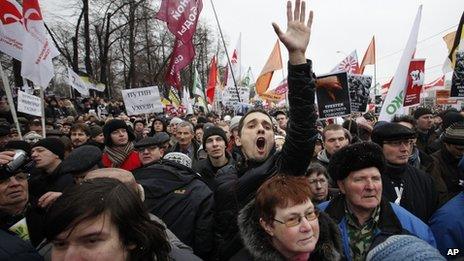
As many as 50,000 people gathered on an island near the Kremlin in Moscow to demand a re-run of the elections
After thousands of protesters took to the streets of Moscow to voice discontent over the disputed election results, Russians living in the UK give their thoughts on events in their home country.
The UK basked in pleasant winter sun on Saturday, but the thoughts of some expatriates were fixed firmly on a place some 2,500km away, in the grip of biting cold.
As anti-government protests took hold of the streets of Moscow, many Russians living in Britain could think of little else.
They followed events from afar, as the capital saw the biggest demonstrations since the fall of the Soviet Union.
Their countrymen and women were out in zero-degree temperatures to highlight allegations of ballot-rigging in the recent parliamentary elections - and many Russians in the UK are just as angry at that prospect.
They spoke of their pride at the way in which protesters were meeting Prime Minister Vladimir Putin head on; he has never experienced popular protests like these before, and they urged a re-run of the elections.
'No democracy'
Mikhail, 23, a singer from Russia's second city of St Petersburg, who is living in Glasgow while he studies opera, is among those who closely watched as Saturday's protests unfold.
"I wish I was there," says the student at the Royal Conservatoire of Scotland.
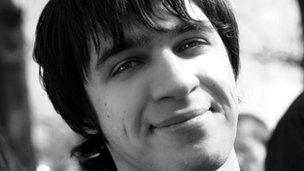
Mikhail says: 'I think something needs to happen now - if it doesn't it won't happen again.'
"Unfortunately, being here, it's not very easy to follow the situation because there's so much different information from different sources.
"But still the situation is very clear that the government is not being democratic. It is corrupt from the top to the bottom and now people are saying they are not happy with that."
He explains how he felt when he first learned of the accusations of widespread fraud in the polls. He says "everyone" in Russia is certain the elections were fixed.
"At first I felt furious because I went to Edinburgh specially to give my vote and everyone else who was interested did so too," says Mikhail, who has been in the UK for more than a year.
"But it seems there is no actual democracy. It doesn't matter what they (protesters) say, the people in charge of the country will do everything to stay there which is completely unacceptable."
He has heard many claims about the polls themselves - including accusations some observers were removed while vote counting was carried out - but he is even more concerned about protesters - among them his friends - out on the streets.
In the immediate aftermath of the election more than 1,000 arrests were made, mostly in Moscow.
"According to some sources the police are taking protesters to police stations even though they are not doing anything against the law," he says.
"I've seen a number of videos where a person is standing on the street not doing anything and he is suddenly surrounded by police guards. It's completely unacceptable.
"How can people feel safe going out onto the streets?"
He says he has been feeling "negative" about the political situation in Russia for many years, but adds: "Now I feel quite proud that people are going out on the streets calling for a better life and a better political situation."
Mikhail says the "best option" is for the elections to be re-run with independent observers. But he sounds a word of caution: "I think something needs to happen now - if it doesn't it won't happen again."
Valeria, 25, a City worker originally from Moscow, says she is bursting with pride at the way protesters have conducted their campaign peacefully.
'Very proud'
"This is a step to show we are not happy and we are not just going to sit down and wait for things to change," says Valeria, who lives in north London and has been in the UK for 10 years.
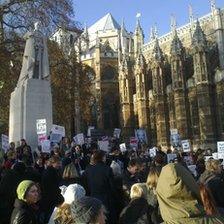
Demonstrators outside the Houses of Parliament in central London
"I am so glad people are taking action."
Valeria was outside the Russian Embassy in London on Friday to take part in a protest, which she says was joined by more than 100 people.
On Saturday more than 200 protesters gathered outside the Houses of Parliament for another demonstration.
She says she found the many thousands of people who joined the protests in Moscow inspiring. Other, smaller rallies took place in St Petersburg and other cities - in some areas people battled snow storms and freezing temperatures to turn out.
"I think this is the first time so many people have come out on the streets since the beginning of the 90s and the government has to listen," she says.
"I feel very proud because the people who have come out are not wild extremists or crazy people they are doctors, teachers - people like me and like my friends - educated people who are finally seeing what is going on," says Valeria.
She is closely following events in her home country, and says she is concerned there has been no mention of any anti-government protests on state television.
'Stay empowered'
She says she hopes Russians will continue to protest and "stay empowered" until their demands - including calls for the cancellation of Sunday's election results and new elections to be held - are met.
"As a Russian citizen I feel this is very important - I don't believe our government should be doing this. It is unacceptable," she adds.
Alexander, 29, from Moscow, has been studying for an MBA at Manchester University since August. He followed the protests online using Twitter and Facebook and websites that see less strict government control.
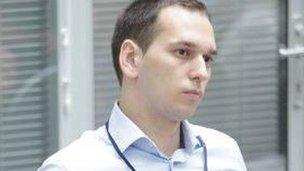
Alexander said he believed change in his home country would take at least five years
"If I was in Moscow I would have been there today," he says.
"The reason is that the whole point of the election is to express your opinion on the government and how you feel the country should be run.
"What is happening is it has been turned into some sort of show. It doesn't matter what you're voting for or what you feel.
"This is why people - including me - are really angry."
He says it is "the beginning of change" for the country, citing amateur video which appeared to show Mr Putin being booed at a martial arts contest in Moscow as extra evidence of anti-government sentiment.
But why now?
"During the past 10 years there's been a significant rise in oil process which has affected income," he explains.
"Despite the fact that people were against the government they have been ok because their incomes continued to rise - now that has stopped.
"The only thing that is left is their genuine opinion of the government so they have started to express it."
'Sacrifice safety'
But he says Mr Putin's government will try to block those who do not support it and he says it is his belief that change will take years rather than months.
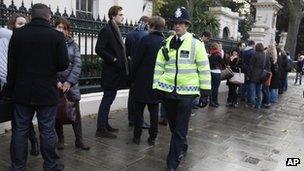
Expatriate Russians queued to vote in the parliamentary elections on 4 December
"I think in five years Russia may have the same scenario as happened in Libya - but in Libya there was support from international institutions, in Russia there won't be."
When asked why he believes it could take five years, he responds: "Because the current Russian government is really strong in terms of police and military action - they are going to suppress any opposition behaviour.
"It will take a while to achieve that crucial point where people will be that angry that they will sacrifice their personal safety to take action against the government."
- Published10 December 2011
- Published7 December 2011